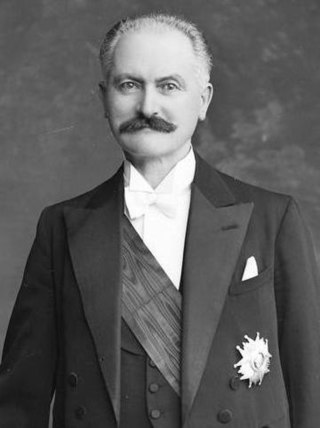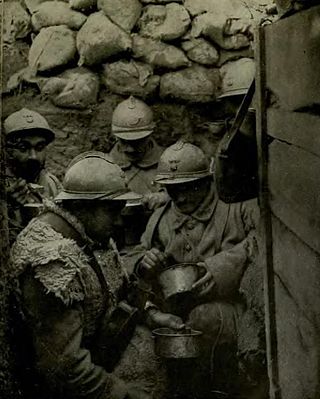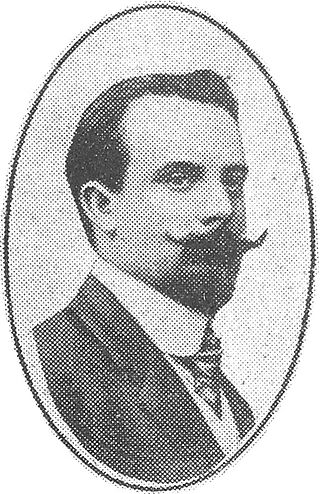The Direction de la Surveillance du Territoire was a directorate of the French National Police operating as a domestic intelligence agency. It was responsible for counterespionage, counterterrorism and more generally the security of France against foreign threats and interference. It was created in 1944 with its headquarters situated at 7 rue Nélaton in Paris. On 1 July 2008, it was merged with the Direction centrale des renseignements généraux into the new Direction centrale du renseignement intérieur.

Aristide Pierre Henri Briand was a French statesman who served eleven terms as Prime Minister of France during the French Third Republic. He is mainly remembered for his focus on international issues and reconciliation politics during the interwar period (1918–1939).

Albert François Lebrun was a French politician who served as President of France from 1932 to 1940. He was the last president of the Third Republic. He was a member of the centre-right Democratic Republican Alliance (ARD).

Poilu is an informal term for a late 18th century–early 20th century French infantryman, meaning, literally, the hairy one. It is still widely used as a term of endearment for the French infantry of World War I. The word carries the sense of the infantryman's typically rustic, agricultural background, and derives from the bushy moustaches and other facial hair affected by many French soldiers after the outbreak of the war as a sign of masculinity. The poilu was particularly known for his love of pinard, his ration of cheap wine.

Law enforcement in France is centralized at the national level. Recently, legislation has allowed local governments to hire their own police officers which are called the police municipale.

The National Gendarmerie is one of two national law enforcement forces of France, along with the National Police. The Gendarmerie is a branch of the French Armed Forces placed under the jurisdiction of the Ministry of the Interior, with additional duties from the Ministry of Armed Forces. Its responsibilities include policing smaller towns, suburbs and rural areas, crowd and riot control, and criminal investigation, including cybercrime. By contrast, the National Police is a civilian law enforcement agency that is in charge of policing cities and larger towns. Because of its military status, the Gendarmerie also fulfills a range of military and defence missions. The Gendarmerie has a strength of around 102,269 people.

The Ticket t+ is the standard single trip ticket for Paris public transit. It can be bought from ticket machines or staffed counters, but not on board buses. As of 2024, it is available as a single paper ticket at the price of €2.15. Since 2019, the ticket can also be loaded onto a reusable Navigo Easy card, which can be purchased for €2 at staffed ticket counters and select ticket vending machines. When using Navigo Easy, the ticket is also available as a pack of 10 at a reduced price of €17.35. Starting 2021, Île-de-France Mobilités is in the process of phasing out the use of paper tickets, and as of September 2023 has discontinued offering a carnet discount for paper tickets. A reduced-price carnet is available for children under 10 years old and some other groups for €8.65.

Jacques Rivière was a French "man of letters" — a writer, critic and editor who was "a major force in the intellectual life of France in the period immediately following World War I". He edited the magazine La Nouvelle Revue Française (NRF) from 1919 until his death. He was influential in winning a general public acceptance of Marcel Proust as an important writer. His friend and brother-in-law was Alain-Fournier, with whom he exchanged an abundant correspondence.

The ATA Carnet, often referred to as the "Passport for goods", is an international customs document that permits the tax-free and duty-free temporary export and import of nonperishable goods for up to one year. It consists of unified customs declaration forms which are prepared ready to use at every border crossing point. It is a globally accepted guarantee for customs duties and taxes which can replace the security deposit required by each customs authority. It can be used in multiple countries in multiple trips up to its one-year validity. The acronym ATA is a combination of French and English terms "Admission Temporaire/Temporary Admission". The ATA carnet is now the document most widely used by the business community for international operations involving temporary admission of goods.

The Public Security of Monaco is the national police force of the Principality of Monaco. It is subordinated from the Monegasque Department of Interior and consists of 515 men and women. With 515 police officers for 35,000 people in 198 hectares, Monaco has the largest per-capita and per-area police force and police presence in the world. Its police includes a specialist unit which operates patrol and surveillance boats.
A government database collects information for various reasons, including climate monitoring, securities law compliance, geological surveys, patent applications and grants, surveillance, national security, border control, law enforcement, public health, voter registration, vehicle registration, social security, and statistics.
Law enforcement in Niger is the responsibility of the Ministry of Defense though the National Gendarmerie and the Ministry of the Interior through the National Police and the National Guard, a paramilitary police force.

Abel Jules Édouard Ferry was a French politician and soldier.

The Directorate-General of Customs and Indirect Taxes, commonly known as les douanes (Customs), is the customs service of the French Republic. It is responsible for levying indirect taxes, preventing smuggling, surveilling borders and investigating counterfeit money. The agency acts as a coast guard, border guard, sea rescue organisation, and customs service. In addition, since 1995, the agency has replaced the Border Police units of the National Police in carrying out immigration control at smaller border checkpoints, in particular at maritime borders and regional airports.

The General Directorate for Internal Security is a French security agency. It is charged with counter-espionage, counter-terrorism, countering cybercrime and surveillance of potentially threatening groups, organisations and social phenomena.

The Caisse des dépôts et consignations is an idiosyncratic French public financial institution created in 1816, often referred to as the investment arm of the French State. It is defined in the French Monetary and Financial Code as a "public group serving the public interest" and a "long-term investor". Its governance framework places it under the control of the Parliament.

The De Broqueville government in Sainte-Adresse refers to two successive Belgian governments, led by Charles de Broqueville, which served as governments in exile during the German occupation of Belgium in World War I. They were based in Le Havre in northern France after October 1914. The first government, known as the First de Broqueville government, was a Catholic government which was elected in 1911 and continued until 1916, when it was joined by Socialists and Liberals expanding it into the Second de Broqueville government, which lasted until 1 June 1918. In November 1914, the vast majority of Belgian territory was under German occupation. The only portion of Belgium that remained controlled by the Kingdom of Belgium in exile was the strip of territory behind the Yser Front.

Georges Louis François Yvetot was a French typographer, anarcho-syndicalist and anti-militarist. He was secretary general of the Fédération des Bourses de travail and deputy secretary general of the Confédération générale du travail in the period leading up to World War I (1914–18). He kept a low profile during the war, and in 1918 was dismissed from the CGT leadership. After the war he contributed to many anarchist journals. He died in poverty during World War II (1939–45).

Marie Mayoux was a French teacher, revolutionary syndicalist, pacifist and libertarian. She and her husband François Mayoux were imprisoned during World War I (1914–18) for her pacifist activities.
















